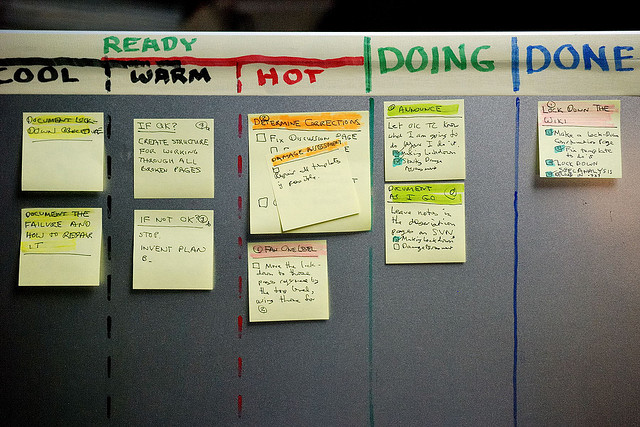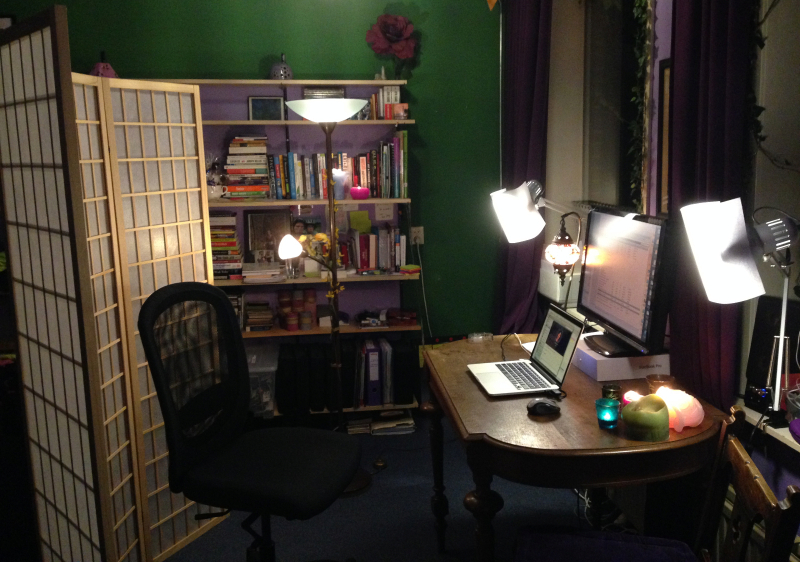by Louise Brace
Benjamin Franklin was quoted to say, “For every minute spent organizing, an hour is earned”. If being organised, means being in control, then everyone needs to learn how.
I have my productive moments and I have some rather less productive moments. When I’m on a roll, I get through work like there’s no tomorrow.
But realistically this isn’t an everyday scenario; even the most successful people need organisation and routine to keep them in check.
I’ve been researching ways to make my days more productive and I thought I’d share some of the best tips, tricks and apps I found to improve workflow and productivity. You can combine various ideas to get the right mix for your situation and habits.
1. Rise and shine
I’m a morning person. I have no qualms about waking at 6am (earlier is pushing it) and getting straight to work. But if you are going to rise early, rather than just ‘getting on with it’, get yourself a morning routine.
Plan: Write down the tasks you want to get done that day. Prioritise the most pressing tasks. The rest should be done, only once you have completed the prioritised work
Exercise: 20-30 minutes of exercise in the morning gets you energised and motivated. A short run or a few sun salutations really help me see the day ahead clearly
Breakfast: they say it’s the most important meal of the day and I have to agree it’s hard to focus without a healthy breakfast to keep you going.
2. Do the hard tasks first
As Benjamin Franklin said – that guy was a serious organisation fanatic, “Don’t put off until tomorrow, what you can do today.” You need a healthy measure of determination to stay focused. Procrastination is not an option if you want to stay productive, especially if you are a remote worker.
Put aside distractions that stop you from focusing on your priorities. That includes social media, email, phone calls, even the fridge!
Set a timeframe to work on each task and stick to it as much as you can. If you’re running past schedule, take a short coffee break and then go back and get it finished.
Don’t be distracted by requests from work colleagues. It’s easy to agree to quickly proofread for a colleague, or have a five minute chat on Skype about an ongoing project, but every time you get distracted, you don’t just lose time, you also lose your train of thought.
3. Schedule social media and email slots
The most innovating and yet distracting tool of the 21st century. Social media is a hugely important part of my daily work routine, but if I replied to every tweet or comment in the moment it arrived, I would seriously get nothing else done.
The most productive way to manage social media mentions is to pick a time – beginning or end of day normally works. If you set up a social media organiser like Hootsuite or MeetEdgar you can schedule your tweets weeks in advance and manage social conversations and mentions; checking at the end of the day for any reactions that are required on your part.
It’s the same for email. I’m a bit of an email addict. I’m practically replying before the email’s even arrived! Hardly an efficient practice. When you need to focus on the task at hand, sign out of your email account or turn your notification alerts down.
You can even set-up an automatic email reply: Louise Brace will respond to your email enquiry within 12 hours, within 24 hours, whatever suits you. You’ll probably reply beforehand, but at least there is no immediate expectation from the sender.
4. Create a productive work space
This is as much about creating the perfect work space, as making sure you have everything you need to hand, before you start the day.
Albert Einstein observed, “If a cluttered desk is a sign of a cluttered mind, of what, then, is an empty desk a sign?” Sometimes, clutter is good; as long as the clutter is related to your ongoing tasks. If you keep having to get up to get something, more time lost.
Our colleague Lisette Sutherland discusses the subject of remote work spaces in her upcoming book, Collaboration Superpowers.
5. Work out your most productive time of day
I’m mega productive first thing in the morning. But then I’m generally in bed by 11pm. My partner, on the other hand, has serious issues about getting up, but can work really productively at midnight. It’s a great idea to keep a diary over a week, identifying your most productive points and plan your schedule around them.
I also don’t work well straight after lunch, so this is a great time for me to exercise. A perfect afternoon motivator.
6. Learn to say no and to delegate
Just say no! When you’re focused, don’t let your colleagues distract you. If you can delegate incoming tasks, do it. If that’s impossible just be honest and say, “I can’t right now, but I’ll prioritise it into my schedule.”
7. Set task days
Some of the brightest minds set ‘Task Days’. I consider myself a great multi-tasker, but the reality is, although we are able to multi-task, it’s not a particularly productive way of working.
Take 20-30 minutes on a Friday or Sunday evening to consider the tasks ahead for the coming week. If you are working on several projects at once, schedule days for each project. Don’t try to cram a bit of each in one day. You’ll just get disorganised and lose that all-important focus.
8. Use productivity tools
So, with Happy Melly, I am learning all about productivity tools and I am finding them a major help. So helpful, in fact, I’ll publish a separate post on just how good some of them are. If staying organised and productive is a daily issue for you, there is probably a tool or app that can help.
If you’re working as part of a remote team, tools like Slack help you keep all of your team communication and shared documents in one place. Very handy, so you don’t have to sift back through emails to find them. And Trello, is a superb project management tool, which lets you track and update projects with your remote team mates.
9. Cut down on commuting
We can’t make a day longer, but we can cut down or stop commuting. Remote working allows you to maximise every minute. In fact a recent Stamford report suggested that remote workers are 13% more effective than office workers. Let’s face it, two hours squeezed into a tube every day is a waste of time and energy, and a sure way to start and finish the day off in a bad mood.
Today’s technology makes it easy and effective to work from home. So it’s no wonder that a Virgin Media Business survey of UK business owners, predicted that 60% of office workers could regularly work from home by 2022. And a similar Office Angels survey predicts that by 2036 commuting will be unheard of.
If you’re part of a virtual team or you want to work remotely, it’s crucial to get your planning skills up to scratch. At home, there’s no one but the cat to motivate you. And there are as many diversions at home, as in the office, they are just different.
Benefits? You get to work in your PJs.
10. If it feels a good time to get it done, just get it done
Ok so just fling everything aside that I just said and add an element of spontaneity. If the time feels right. Jump on it. Sometimes there is no better time than the present.
11. Get a good night’s sleep, if you can
There’s nothing better to set you up for a productive day’s work.
But before you do, tick off everything you got done today. There’s little more satisfying than ticking off your to do list 🙂
Image credits on FlickR:
Teaser image by Sebastien Wiertz
Top image by Dennis Hamilton
Commuting by Kurtis Garbutt





I’m not a social media addict type of guy but I keep checking my phone for emails during work as my clients and colleagues connect with me through it and now I realized it’s my biggest distraction.
Perhaps I have to keep it away while I’m working and check it during breaks.
Thank you for the tips Louise.
P.S. I’m on break as I comment on this article 😉
Hi Chris,
Thanks for the feedback. I use social media for work, but once you’re in, it’s so easy to get distracted and the next minute you’re off on a completely separate tangent. And email I have a bit of an obsession with. When you find yourself checking for emails on your phone during dinner, you know it’s time to make a plan and get your life back!
p.s. I’m not on a break 😉
I’ve really got to learn to say no, Louise. But, as a one-man writing business, I’m unable to delegate. Great read.
Thanks Matthew. I empathise with you. I sometimes wake up feeling today is the day I conquer the world, but it takes a lot of determination to stick to a daily routine and achieve everything you plan in. And as you say if you’re unable to delegate, you tend to get wrapped up minor details that end up taking longer than you imagine.
And the devil’s in the detail, Louise.
Thank you for the great article. It does help when we move in fast paced, agile world of technology and when work afternoon comes, we try to make most of it!
Bluepen Software.